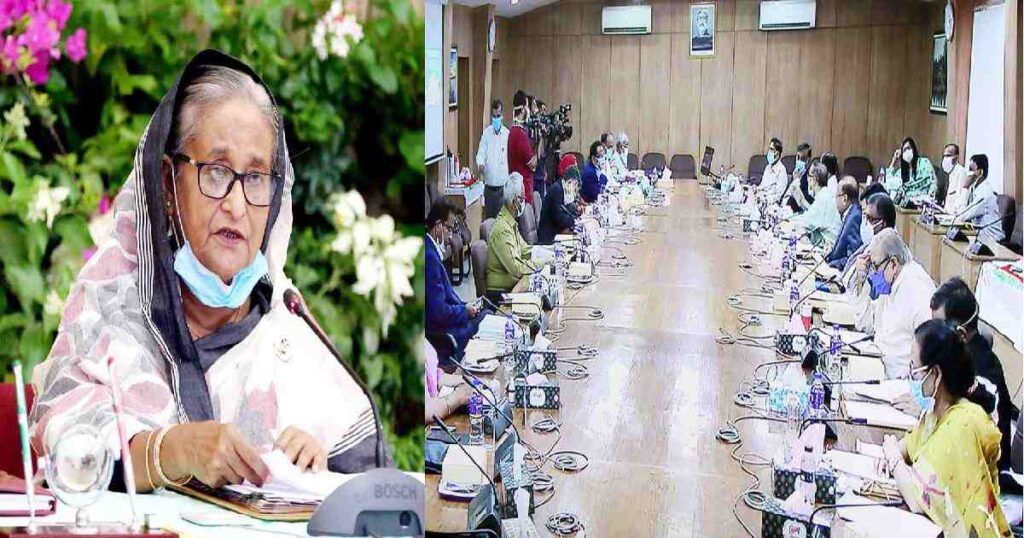Amid widespread protests against the growing incidents of rape in the country, the government has planned to enact a law with a provision of death penalty as the highest punishment for the heinous crime.
The Cabinet on Monday approved the draft of the Women and Children Repression Prevention (Amendment) Bill, 2020 in this regard.
The approval came from the weekly Cabinet meeting held virtually with Prime Minister Sheikh Hasina in the chair. The Prime Minister joined the meeting through a videoconference from Ganobhaban, while other cabinet members got connected from the Bangladesh Secretariat.
In the proposed law, the punishment for rape is death penalty or life imprisonment, said Cabinet Secretary Khandker Anwarul Islam at a press briefing after the meeting.
According to Article 9 (1) of the existing Women and Children Repression Prevention Act-2000, the punishment for rape is life imprisonment.
“The Women and Children Affairs Ministry placed the draft bill at the Cabinet meeting for approval bringing amendments to Article 9 (1) of the existing law. The death penalty or life sentence has been proposed as the punishment for rape in it. The Cabinet has agreed on it (the proposal),” said the Cabinet Secretary.
He said the government is amending the law in order to deal with violence against women and children with an iron hand in society.
Since Parliament is not in session now, the bill can be turned into a law in the format of an ordinance, he said adding that the President may promulgate the Women and Children Repression Prevention (Amendment) Ordinance, 2020 exercising the power bestowed in the Article 93 (1) of the Constitution.
Khandker Anwarul Islam said a massive campaign now continues in the country seeking death penalty. So, it will have a positive impact on the common people. The criminals will now be scared due to the death penalty provision, he said.
According to the Article 9 (3) of the existing law, if a woman falls victim to gage-rape and gets injured or die, the punishment is the death penalty or life imprisonment for each rapist.
As per the bill, changes were also proposed to two other sub-articles –-11 (Ga) and 20 (7) –of the existing law, he said.
He said any simple injury for dowry will be a compoundable offence (the complaint can compromise to drop the charge against the accused) in accordance with the article 11 (Ga) of the proposed law.
As per the 11 (Ga) Article of the existing law, one shall be sentenced for maximum three years but minimum one year’s rigorous imprisonment and will be awarded pecuniary (monetary) penalty as the punishment for making the ‘simple hurt’ for dowry.
In the article 20 (7) of the bill, ‘the Children Act, 2013’ has been incorporated in place of ‘Children Act, 1974’ to follow the latest law as much as possible during the trial of any crime committed under the Women and Children Repression Prevention Act-2000 in case any child commits or witnesses such crime.
In replying to a question, the cabinet secretary said the trial of rape cases shall be completed by 180 days at Women and Children Repression Prevention Tribunals according to the existing law.
Anger grows
Despite widespread protests against rape and the government’s plan to toughen the law in this regard, the incidents of rape, gang rape and molestation never seem to decline across the country.
According to Ain-o-Salish Kendra (ASK), a human rights organisation, some 1,000 rape cases were reported in the country, including 208 gang rapes, between January and September 2020.
Waves of anti-rape demonstrations erupted across Bangladesh after a video footage of five men gang-raping a housewife, stripping her naked and filming the video of the incident in Noakhali’s Begumganj upazila, went viral on social media on Sunday.
The incident occurred at Joykrishnapur village under Eklashpur union of the upazila on September 2. Protesters including students, leaders and activists of different organisations have been demonstrating for the last few days over the growing incidents of rape, sexual harassment and violence against women in Bangladesh.
MoFA’s anti-Covid activities
At the meeting, the Cabinet was also informed about the activities taken by the Ministry of Foreign Affairs (MoFA) in the face of the Covid-19 pandemic.
The Foreign Ministry said Bangladesh continues its diplomatic efforts to get the possible Covid-19 vaccines on priority basis. The Foreign Ministry opened a special ‘corona cell’ in March after the WHO announced Covid-19 as a pandemic.
According to the data placed by the Foreign Ministry at the Cabinet meeting, a total of 89,840 expatriate Bangladeshis returned home from the Middle Eastern countries from April 15 to October 1.
RMG sector & Covid
The meeting was also informed that the purchase orders, received by the country’s apparel sector before the outbreak of Covid-19, were mostly cancelled. But the garment sector has got back most of the cancelled orders due to active diplomatic efforts of the Foreign Ministry.
source: UNB




